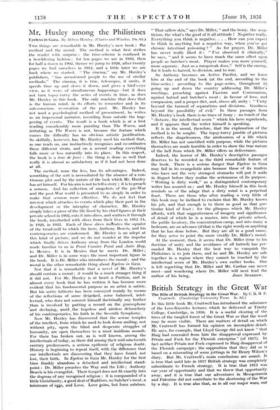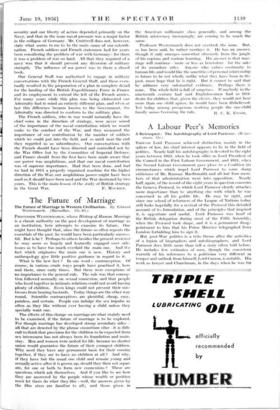British Strategy in the Great War
IN this little book Mr. Cruttwell has introduced the substance of the Lees-Knowles lectures which he delivered at Trinity College, Cambridge, in 1936. It is a useful clearing of the trees of the tangled forest of the Great War so that the wood may be more visible. There are matters of detail on which Mr. Cruttwell has formed his opinion on *complete detail. He says, for example, that Lloyd George did not know " that Haig had concealed from him the disapproval expressed by Pets* and Foch for the Flemish enterprise " (of 1917). In fact neitherPetain nor Foch expressed to Haig disapproyal of the Flemish campaign ; the supposition that they did so is based on a misreading of some jottings in Sir Henry Wilson's diary. But Mr. Cruttwell's main conclusions are sound. It is true that until late in 1917 British strategy was completely subordinate to French strategy. It is true that 1915 was our year of opportunity and that we threw that opportunity away, and it is true that our adventures in Mesopotamia and Palestine did not contribute to the shortening of the War by a day. It is true also that, as in all our major wars, our
security and our liberty of action depended primarily on the Navy, and that in the issue naval pressure was a major factor in the collapse of Germany. Mr. Cruttwell does not, however, state what seems to me to be the main cause of our subordi- nation. French soldiers and French statesmen had for years been considering the problem of war with Germany ; for them it was a problem of war on land. All that they required of a navy was that it should prevent any diversion of military strength. The influence of sea power was to them a closed book.
Our General Staff was authorised to engage in military conversations with the French General Staff, and these even- tually resulted in the preparation of a plan in complete detail for the landing of the British Expeditionary Force in France and its employment to extend the left of the French armies. For many years while this plan was being elaborated our Admiralty had in mind an entirely different plan, and when at last this difference became known to the Government, the Admiralty was directed to conform to the military plan.
The French soldiers, who in war would naturally have the chief voice in the 'direction of strategy, were never seized of the importance of the naval contribution which we would make to- -the conduct of the War, and they measured the importance of our contribution by the number of soldiers which we could put into the field, and so until near the end they regarded us as subordinates. Our conversations with the French should have been directed and controlled not by the War Office but by the Committee of Imperial Defence, and France should from the first have been made aware that our poWer was amphibious, and that our naval contribution was of supreme importance. Had that been done, and had we had in 1915 a properly organised machine for the higher direction of the War, our amphibious power might have been used as it should have been used and the War shortened by two years. This is the main lesson of the study of British strategy











































 Previous page
Previous page